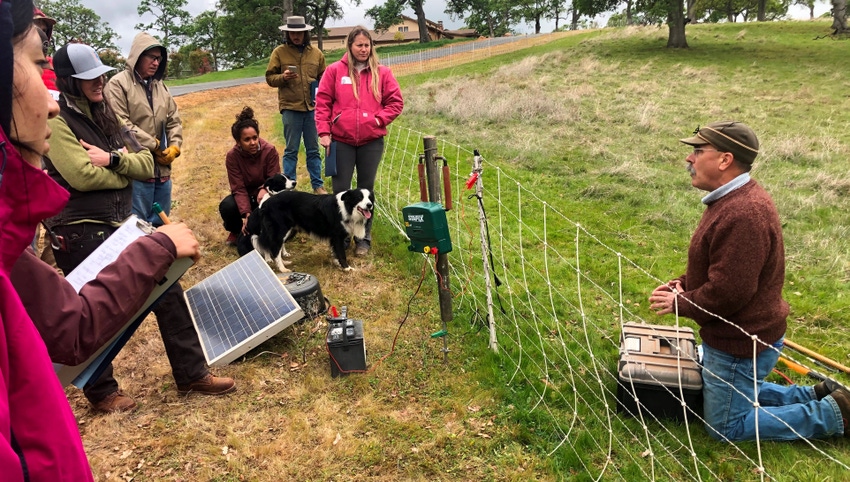
California farmers stand to benefit from the addition of more commodities now covered by the USDA Coronavirus Food Assistance Program, say UC Agriculture and Natural Resources experts. Yesterday (Aug. 11) the U.S. Department of Agriculture expanded eligibility and extended the deadline to apply to Sept 11.
Farmers of aquaculture, nursery crops and flowers, sheep and specialty crops such as dates, dragon fruit, nectarines, pomegranates, pumpkins and many other specialty crops grown in California are now eligible for financial assistance to help keep their operations afloat during the business disruption caused by the pandemic.
Here are some remarks by University of California Cooperative Extension advisors and specialists working with growers:
Daniel Macon, UC Cooperative Extension livestock and natural resources advisor serving Placer, Nevada, Sutter and Yuba counties, [email protected]
“Including all sheep will be HUGE for California producers. Most California lambs are born in the fall and marketed in the late spring. The rest of the West has lambs born in the spring and marketed in the fall/winter/early spring. The original CFAP payments provided a maximum payout to lambs that would have been marketed earlier than most California lambs. And provided no payment for what we call running-age ewes (breeding animals).”
Jackson Gross, UC Cooperative Extension aquaculture specialist at UC Davis, [email protected]
“This is a big distinction for our California freshwater fish producers. While it doesn't cover all of the diversity in California aquaculture, it does cover the majority of our industry as far as freshwater fish producers. A specialty crop distinction is important for our fish farmers, making them eligible for specialty crop funding and numerous other federal and state programs that were previously inaccessible.”
Cheryl Wilen, director of UC Cooperative Extension in San Diego County, [email protected]
“It is my impression that ornamental nurseries will really have a good opportunity to recover money for unsold crops.”
Ruth Dahlquist-Willard, UC Cooperative Extension small farms and specialty crops farm advisor for Fresno and Tulare counties, [email protected]
“For the small-scale specialty vegetable and herb growers, it's definitely helpful to have some of their crops on the list, like bok choy, daikon, etc. But the process of signing up can be prohibitive, especially with some USDA offices only offering remote service, and the payment amounts are very low compared to the amount of paperwork required.”
Ramiro Lobo, UC Cooperative Extension small farms and agricultural economics advisor in San Diego County, [email protected]
“The specific mention of minor crops can be significant for small-scale growers in the state, and Southern California in particular for growers of crops like dragon fruit, and other minor subtropicals because it legitimizes them as commercial crops.”
Aparna Gazula, UC Cooperative Extension small farms and specialty crops farm advisor for Santa Clara, San Benito, and Santa Cruz counties, [email protected]
“It's great that the USDA Coronavirus Food Assistance Program has been expanded to include more minor crops. I hope the USDA offices have bilingual staff who can work with socially disadvantaged farmers with language barriers that often grow these crops.”
Aliasghar Montazar, UC Cooperative Extension irrigation and water management advisor in Imperial and Riverside counties, [email protected]
“Maintaining date palms over the season is very labor oriented. During February to May, a lot of activities need to be conducted at a certain time. As you know, we had high pressure from the pandemic in the Coachella Valley during these months. It made labor less available, which created some challenges for growers.”
Mae Culumber, UC Cooperative Extension nut crop advisor in Fresno County, [email protected]
“Almonds, pistachios and walnuts commodities all suffered a price decline between mid-January and mid-April as a result of the COVID-19 pandemic. Thirty to 50 percent of the previous season's crop is normally marketed during this time of the year. The CFAP program will provide financial relief for losses due to price decline and spoiled shipments that lost a marketing channel due to the pandemic. Commodity boards are working with the Farm Service Agency to assist producers in applying for the program.”
Source: University of California Division of Agriculture and Natural Resources, which is solely responsible for the information provided and is wholly owned by the source. Informa Business Media and all its subsidiaries are not responsible for any of the content contained in this information asset.
About the Author(s)
You May Also Like




